Submitted:
24 March 2024
Posted:
25 March 2024
You are already at the latest version
Abstract
Keywords:
1. Introduction
2. Data Collection and Methods
3. Results and Discussion
3.1. Number of Literature and Dates of Publication
3.2. Journals Published
3.3. Key Authors
3.4. The Five Lake Regions
3.5. Dating Scales
3.6. Key Themes
3.6.1. Paleoclimate Reconstruction
3.6.2. Paleovegetation Reconstruction
3.6.3. The Evolution of Lake Ecosystems
3.6.4. Environmental Change of Lakes
4. Concluding Remarks
Author Contributions
Funding
Acknowledgments
Conflicts of Interest
References
- Shen, J. Progress and prospect of palaeolimnology research in China. J. Lake Sci. 2009, 21, 307–313. [Google Scholar] [CrossRef]
- Sumin, W.; Hongshen, D. Compendium of Chinese Lake; Beijing: Science Press: 1998.
- Pleskot, K.; Apolinarska, K.; Kołaczek, P.; Suchora, M.; Fojutowski, M.; Joniak, T.; Kotrys, B.; Kramkowski, M.; Słowiński, M.; Woźniak, M.; et al. Searching for the 4.2 ka climate event at Lake Spore, Poland. CATENA 2020, 191, 104565. [Google Scholar] [CrossRef]
- Ji, S.; Bin, X.; Jinglu, W.; Yanhong, W.; Xingqi, L.; Xiangdong, Y.; Jian, L.; Sumin, W. Lake Sedimentation and Environmental Evolution; Beijing: Science Press: 2010.
- Rose, N.L.; Morley, D.; Appleby, P.G.; Battarbee, R.W.; Alliksaar, T.; Guilizzoni, P.; Jeppesen, E.; Korhola, A.; Punning, J.M. Sediment accumulation rates in European lakes since AD 1850: Trends, reference conditions and exceedence. J. Paleolimnol. 2011, 45, 447–468. [Google Scholar] [CrossRef]
- Changfu, L. An expedition to Lop Nur. New Asia 1935, 10, 1–5. [Google Scholar]
- Fanli, T. Exploration in Qinghai. J. Geosci. 1910, 1, 1–7. [Google Scholar]
- Pinxian, W.; Chuanlian, L.; Jiashu, C.; Dongjing, C. Anthology of paleolimnology; Beijing:Maritime Press: 1991.
- Jenny, J.-P.; Koirala, S.; Gregory-Eaves, I.; Francus, P.; Niemann, C.; Ahrens, B.; Brovkin, V.; Baud, A.; Ojala, A.E.K.; Normandeau, A.; et al. Human and climate global-scale imprint on sediment transfer during the Holocene. Proc. Natl. Acad. Sci. U S A. 2019, 116, 22972–22976. [Google Scholar] [CrossRef] [PubMed]
- Li, W.; Mu, G.; Lin, Y.; Zhang, D. Abrupt climatic shift at ~4000 cal. yr B.P. and late Holocene climatic instability in arid Central Asia: Evidence from Lop Nur saline lake in Xinjiang, China. Sci. Total Environ. 2021, 784, 147202. [Google Scholar] [CrossRef] [PubMed]
- Song, C.; Fan, C.; Zhu, J.; Wang, J.; Sheng, Y.; Liu, K.; Chen, T.; Zhan, P.; Luo, S.; Yuan, C.; et al. A comprehensive geospatial database of nearly 100 000 reservoirs in China. Earth Syst. Sci. Data 2022, 14, 4017–4034. [Google Scholar] [CrossRef]
- Wolfe, A.P.; Hobbs, W.O.; Birks, H.H.; Briner, J.P.; Holmgren, S.U.; Ingólfsson, Ó.; Kaushal, S.S.; Miller, G.H.; Pagani, M.; Saros, J.E.; et al. Stratigraphic expressions of the Holocene–Anthropocene transition revealed in sediments from remote lakes. Earth-Sci. Rev. 2013, 116, 17–34. [Google Scholar] [CrossRef]
- Liu, Y.-y.; Chen, G.; Meyer-Jacob, C.; Huang, L.; Liu, X.; Huang, G.; Klamt, A.M.; Smol, J.P. Land-use and climate controls on aquatic carbon cycling and phototrophs in karst lakes of southwest China. Sci. Total Environ. 2020, 751, 141–738. [Google Scholar] [CrossRef]
- Arnaud, F.; Poulenard, J.; Giguet-Covex, C.; Wilhelm, B.; Revillon, S.; Jean-Philippe, J.; Revel, M.; Enters, D.; Bajard, M.; Fouinat, L.; et al. Erosion under climate and human pressures: An alpine lake sediment perspective. Quat. Sci. Rev. 2016, 152, 1–18. [Google Scholar] [CrossRef]
- Canziani, G.; Ferrati, R.; Rossi, C.; Ruiz-Moreno, D. The influence of climate and dam construction on the Ibera wetlands, Argentina. Reg. Environ. Change 2006, 6, 181–191. [Google Scholar] [CrossRef]
- Wu, Y.; Wang, S. Assessment of nutrient sources and paleoproductivity during the past century in Longgan Lake, middle reaches of Yangtze River, China. Chin. J. Geochem. 2006, 25, 18–19. [Google Scholar] [CrossRef]
- Yuan, Z.; Wu, D.; Niu, L.; Ma, X.; Li, Y.; Hillman, A.L.; Abbott, M.B.; Zhou, A. Contrasting ecosystem responses to climatic events and human activity revealed by a sedimentary record from Lake Yilong, southwestern China. Sci. Total Environ. 2021, 783, 146922. [Google Scholar] [CrossRef] [PubMed]
- Liu, C.; Zhang, J.-F.; Jiao, P.; Mischke, S. The Holocene history of Lop Nur and its palaeoclimate implications. Quat. Sci. Rev. 2016, 148, 163–175. [Google Scholar] [CrossRef]
- Tian, L.; Wang, M.; Zhang, X.; Yang, X.; Zong, Y.; Jia, G.; Zheng, Z.; Man, M. Synchronous change of temperature and moisture over the past 50 ka in subtropical southwest China as indicated by biomarker records in a crater lake. Quat. Sci. Rev. 2019, 212, 121–134. [Google Scholar] [CrossRef]
- Aichner, B.; Herzschuh, U.; Wilkes, H.; Schulz, H.-M.; Wang, Y.; Plessen, B.; Mischke, S.; Diekmann, B.; Zhang, C. Ecological development of Lake Donggi Cona, north-eastern Tibetan Plateau, since the late glacial on basis of organic geochemical proxies and non-pollen palynomorphs. Palaeogeogr. Palaeoclimatol. Palaeoecol. 2012, 313–314, 140–149. [Google Scholar] [CrossRef]
- Xiao, X.; Yang, X.; Shen, J.; Wang, S.; Xue, B.; Tong, X. Vegetation history and dynamics in the middle reach of the Yangtze River during the last 1500 years revealed by sedimentary records from Taibai Lake, China. The Holocene 2013, 23, 57–67. [Google Scholar] [CrossRef]
- Yao, Y.F.; Song, X.Y.; Wortley, A.H.; Wang, Y.F.; Blackmore, S.; Li, C.S. Pollen-based reconstruction of vegetational and climatic change over the past ~30 ka at Shudu Lake in the Hengduan Mountains of Yunnan, southwestern China. PLoS ONE 2017, 12, e0171967. [Google Scholar] [CrossRef]
- Hillman, A.L.; Abbott, M.B.; Yu, J.; Bain, D.J.; Chiou-Peng, T. Environmental legacy of copper metallurgy and Mongol silver smelting recorded in Yunnan Lake sediments. Environ. Sci. Technol. 2015, 49, 3349–3357. [Google Scholar] [CrossRef]
- Liu, E.; Shen, J.; Birch, G.F.; Yang, X.; Wu, Y.; Xue, B. Human-induced change in sedimentary trace metals and phosphorus in Chaohu Lake, China, over the past half-millennium. J. Paleolimnol. 2012, 47, 677–691. [Google Scholar] [CrossRef]
- Zhou, F.; Guo, H.-C.; Ho, Y.-S.; Wu, C.-Z. Scientometric analysis of geostatistics using multivariate methods. Scientometrics 2007, 73, 265–279. [Google Scholar] [CrossRef]
- Niu, B.; Hong, S.; Yuan, J.; Peng, S.; Wang, Z.; Zhang, X. Global trends in sediment-related research in earth science during 1992–2011: A bibliometric analysis. Scientometrics 2014, 98, 511–529. [Google Scholar] [CrossRef]
- Peibo, C.; Xilin, L. Bibliometric Analysis of the Progress in Benggang Research in China. Trop. Geogr. 2015, 35, 895–900. [Google Scholar] [CrossRef]
- Ruijie, W.; Gang, L.; Yaoyang, X. Network analysis of Literature in Formation of Lake Sediment: Research Status and Hotspot. R. E. Yangtze Basin 2019, 28, 192–201. [Google Scholar]
- Wang, T.; Chen, S.; Liu, R.; Liu, D.; Fang, Y. Spatial distribution and source apportionment of surface soil’s polycyclic aromatic hydrocarbons in the Yangtze River Delta. Environ. Geochem. Health, 2024. [Google Scholar] [CrossRef]
- Liping, Z.; Guoqing, Z.; Ruimin, Y.; Chong, L.; Kun, Y.; Baojin, Q.; Boping, H. Lake variations on Tibetan Plateau of recent 40 years and future changing tendency. Bull. Chin. Acad. Sci. 2019, 34, 1254–1263. [Google Scholar] [CrossRef]
- Zhao, M.; Running, S.W.; Nemani, R.R. Sensitivity of Moderate Resolution Imaging Spectroradiometer (MODIS) terrestrial primary production to the accuracy of meteorological reanalyses. J. Geophys. Res. Biogeosci. 2006, 111, 111. [Google Scholar] [CrossRef]
- Boxian, S.; Chunlei, X.; Dan, Z.; Zhenzhou, Z.; Gaoqiang, Z. Distribution characteristics of lakes in China and suggestions for ecological protection and restoration of typical river basins. Geol. Surv. China 2021, 8, 114–125. [Google Scholar] [CrossRef]
- Wenhui, J.; Ce, Z.; Bing, W.; En, Z.; Haiwei, N.; Jingyue, L.; Shuangfa, D. Remote sensing dynamic monitoring and ecological environmental changes of Bashang Plateau wetland from 2000 to 2018. Min. explor. 2020, 11, 2720–2728. [Google Scholar] [CrossRef]
- Xu, D.; Lu, H.; Jin, C.; Gu, Z.; Zuo, X.; Dong, Y.; Wang, C.; Wang, L.; Li, H.; Yu, Y.; et al. Application of multiple dating techniques to the Holocene sediments of Angrenjin Co in the southern Tibetan Plateau. Quat. Geochronol. 2021, 62, 101148. [Google Scholar] [CrossRef]
- Liu, J.; Wang, R.; Zhao, Y.; Yang, Y. A 40,000-year record of aridity and dust activity at Lop Nur, Tarim Basin, northwestern China. Quat. Sci. Rev. 2019, 211, 208–221. [Google Scholar] [CrossRef]
- Chao, G.; Hongwei, M.; Yuzhen, M.; Dandan, L.; Caili, H.; Jierui, L.; Congwen, L.; Kai, W. Environmental variations recorded by chemical element in the sediments of Lake Yamzhog Yumco on the southern Tibetan Plateau over the past 2000 years. Acta. Geogr. Sin. 2019, 74, 1345–1362. [Google Scholar] [CrossRef]
- Cook, C.G.; Jones, R.T.; Turney, C.S.M. Catchment instability and Asian summer monsoon variability during the early Holocene in southwestern China. Boreas 2013, 42, 224–235. [Google Scholar] [CrossRef]
- Chen, C.-T.A.; Lan, H.-C.; Lou, J.-Y.; Chen, Y.-C. The Dry Holocene Megathermal in Inner Mongolia. Palaeogeogr. Palaeoclimatol. Palaeoecol. 2003, 193, 181–200. [Google Scholar] [CrossRef]
- Chen, H.; Zhu, L.; Wang, J.; Ju, J.; Ma, Q.; Xu, T. Paleoclimate changes over the past 13,000 years recorded by Chibuzhang Co sediments in the source region of the Yangtze River, China. Palaeogeogr. Palaeoclimatol. Palaeoecol. 2021, 573, 110433. [Google Scholar] [CrossRef]
- Zhang, W.; Niu, J.; Ming, Q.; Shi, Z.; Lei, G.; Huang, L.; Long, X.e.; Chang, F. Holocene climatic fluctuations and periodic changes in the Asian southwest monsoon region. J. Asian Earth Sci. 2018, 156, 90–95. [Google Scholar] [CrossRef]
- He, Y.; Hou, J.; Brown, E.T.; Xie, S.; Bao, Z. Timing of the Indian Summer Monsoon onset during the early Holocene: Evidence from a sediment core at Linggo Co, central Tibetan Plateau. The Holocene 2017, 28, 755–766. [Google Scholar] [CrossRef]
- Sun, Q.; Xie, M.; Shi, L.; Zhang, Z.; Lin, Y.; Shang, W.; Wang, K.; Li, W.; Liu, J.; Chu, G. Alkanes, compound-specific carbon isotope measures and climate variation during the last millennium from varved sediments of Lake Xiaolongwan, northeast China. J. Paleolimnol. 2013, 50, 331–344. [Google Scholar] [CrossRef]
- Ma, L.; Wu, J.; Abuduwaili, J. Climate and environmental changes over the past 150 years inferred from the sediments of Chaiwopu Lake, central Tianshan Mountains, northwest China. Int. J. Earth Sci. 2013, 102, 959–967. [Google Scholar] [CrossRef]
- Wang, Y.; Zhu, L.; Wang, J.; Ju, J.; Peng, P.; Lin, X.; Hu, J.; Nishimura, M. Paleohydrological processes revealed by n-alkane δD in lacustrine sediments of Lake Pumoyum Co, southern Tibetan Plateau, and their response to climate changes during the past 18.5 cal ka. J. Paleolimnol. 2016, 56, 223–238. [Google Scholar] [CrossRef]
- Hillman, A.L.; O’Quinn, R.F.; Abbott, M.B.; Bain, D.J. A Holocene history of the Indian monsoon from Qilu Lake, southwestern China. Quat. Sci. Rev. 2020, 227, 106051. [Google Scholar] [CrossRef]
- Shen, J.; Yang, L.; Yang, X.; Matsumoto, R.; Tong, G.; Zhu, Y.; Zhang, Z.; Wang, S. Lake sediment records on climate change and human activities since the Holocene in Erhai catchment, Yunnan Province, China. Sci. China Ser. D-Earth Sci. 2005, 48, 353–363. [Google Scholar] [CrossRef]
- Jin, Z.-D.; Wu, Y.; Zhang, X.; Wang, S. Role of late glacial to mid-Holocene climate in catchment weathering in the central Tibetan Plateau. Quat. Res. 2005, 63, 161–170. [Google Scholar] [CrossRef]
- Li, C.; Li, B.; Li, Y.; Chen, B.; Xu, Q.; Zhang, W.; Liu, W.; Ding, G. Variation of summer monsoon intensity in the North China Plain and its response to abrupt climatic events during the early-middle Holocene. Quat. Int. 2020, 550, 66–73. [Google Scholar] [CrossRef]
- Li, K.; Liu, X.; Wang, Y.; Herzschuh, U.; Ni, J.; Liao, M.; Xiao, X. Late Holocene vegetation and climate change on the southeastern Tibetan Plateau: Implications for the Indian Summer Monsoon and links to the Indian Ocean Dipole. Quat. Sci. Rev. 2017, 177, 235–245. [Google Scholar] [CrossRef]
- Wang, W.; Feng, Z.; Ran, M.; Zhang, C. Holocene climate and vegetation changes inferred from pollen records of Lake Aibi, northern Xinjiang, China: A potential contribution to understanding of Holocene climate pattern in East-central Asia. Quat. Int. 2013, 311, 54–62. [Google Scholar] [CrossRef]
- Herzschuh, U.; Winter, K.; Wünnemann, B.; Li, S. A general cooling trend on the central Tibetan Plateau throughout the Holocene recorded by the Lake Zigetang pollen spectra. Quat. Int. 2006, 154–155, 113–121. [Google Scholar] [CrossRef]
- Zhao, K.; Li, X.; Dodson, J.; Xinying, Z.; Atahan, P. Climate instability during the last deglaciation in central Asia, reconstructed by pollen data from Yili Valley, NW China. Rev. Palaeobot. Palynol. 2013, 189, 8–17. [Google Scholar] [CrossRef]
- Pei, M.; Yongli, W.; Zixiang, W.; Gen, W.; Youxiao, W. Compound-specific Carbon Isotopic Characteristics of n-alkanes in Xianghai Lake Sediments of Northeast China and Their Paleoenvironmental Implications. J. Earth Sci. Environ. 2014, 36, 110–120. [Google Scholar] [CrossRef]
- Lan, B.; Zhang, D.; Yang, Y. Evolution of Lake Ailike (northern Xinjiang of China) during past 130 years inferred from diatom data. Quat. Int. 2018, 475, 70–79. [Google Scholar] [CrossRef]
- Chen, C.; Zhao, L.; Zhu, C.; Wang, J.; Jiang, J.; Yang, S. Response of diatom community in Lugu Lake (Yunnan–Guizhou Plateau, China) to climate change over the past century. J. Paleolimnol. 2014, 51, 357–373. [Google Scholar] [CrossRef]
- Yan, D.; Xu, H.; Yang, M.; Lan, J.; Hou, W.; Wang, F.; Zhang, J.; Zhou, K.; An, Z.; Goldsmith, Y. Responses of cyanobacteria to climate and human activities at Lake Chenghai over the past 100 years. Ecol. Indic. 2019, 104, 755–763. [Google Scholar] [CrossRef]
- Wu, J.; Ma, L.; Yu, H.; Zeng, H.; Liu, W.; Abuduwaili, J. Sediment geochemical records of environmental change in Lake Wuliangsu, Yellow River Basin, north China. J. Paleolimnol. 2013, 50, 245–255. [Google Scholar] [CrossRef]
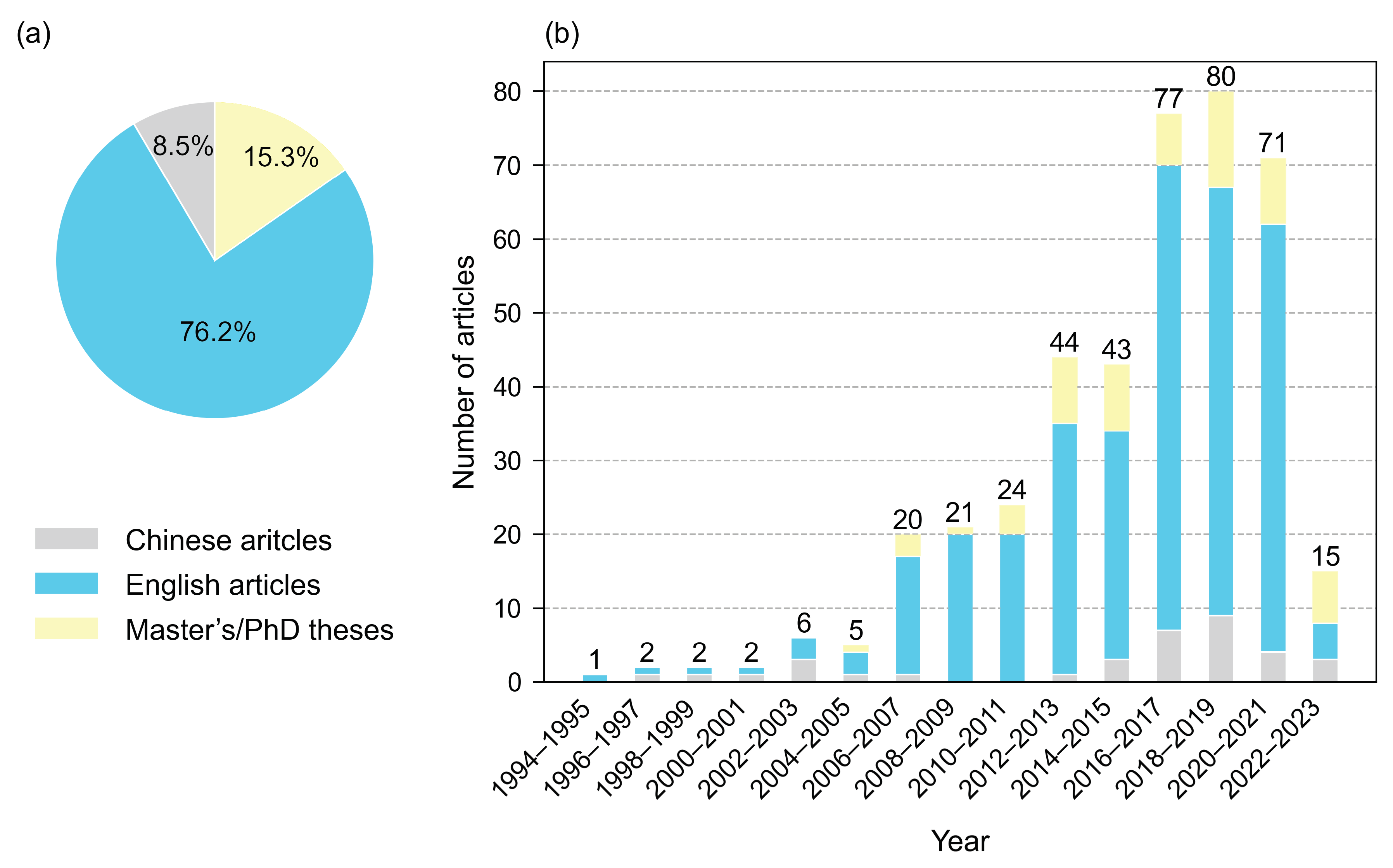
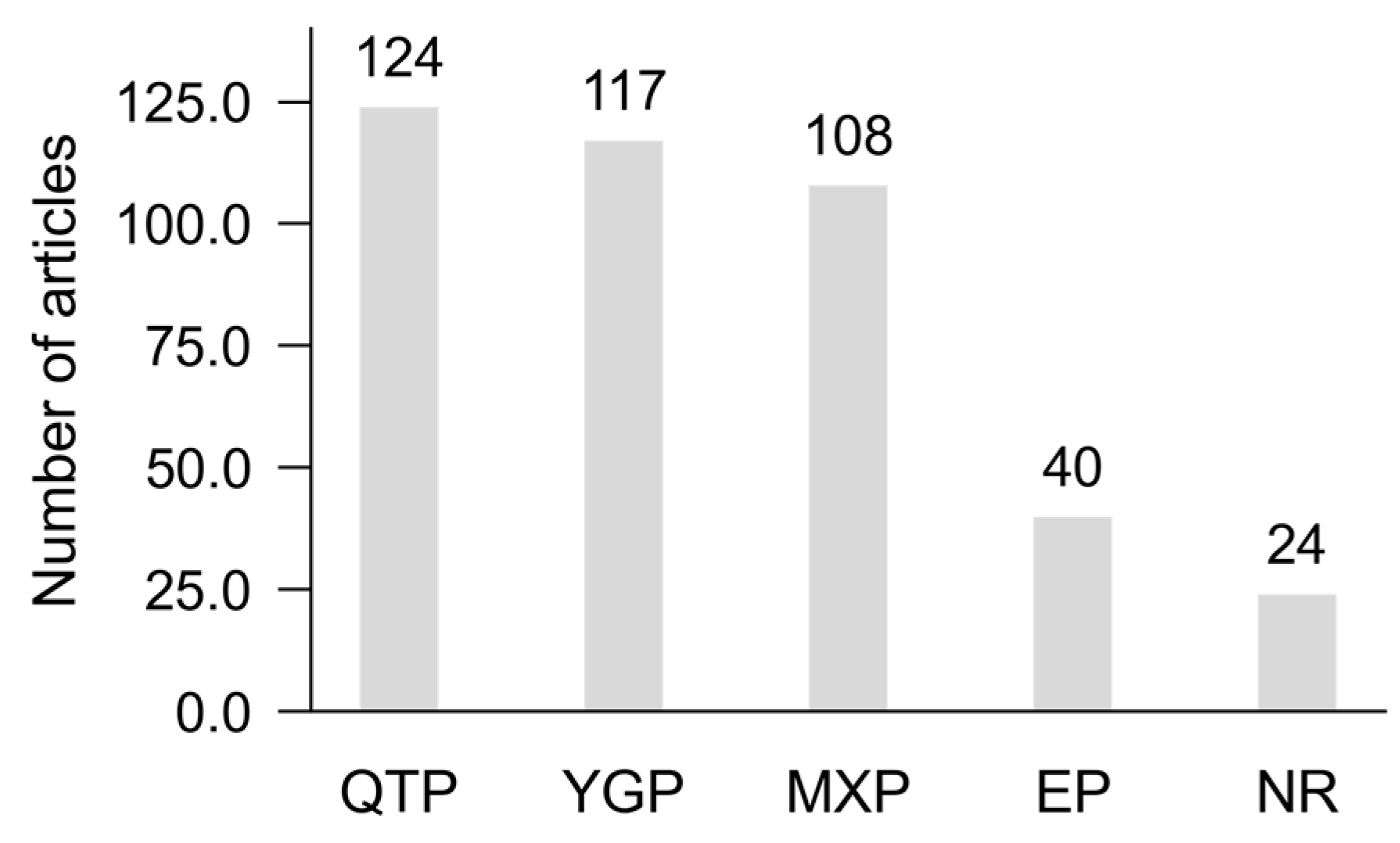
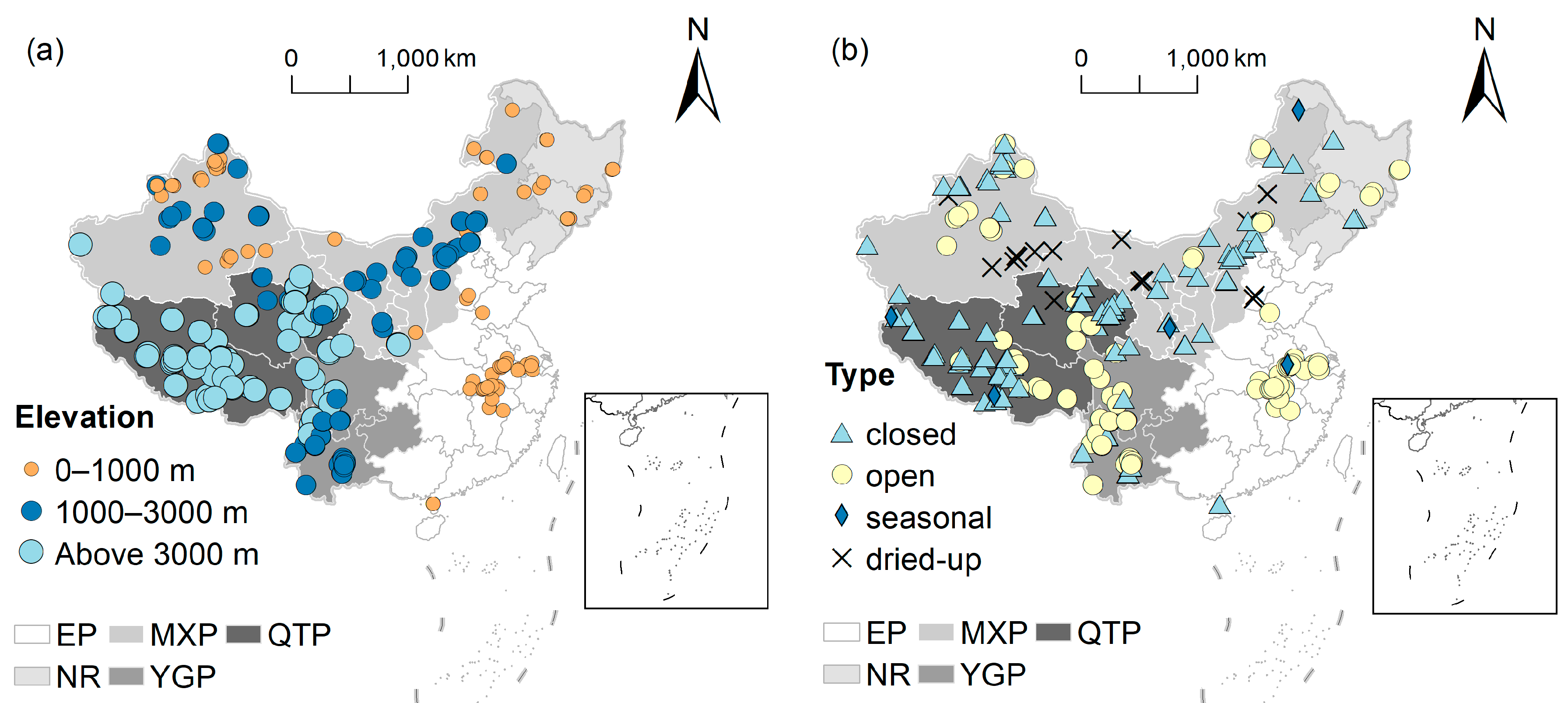
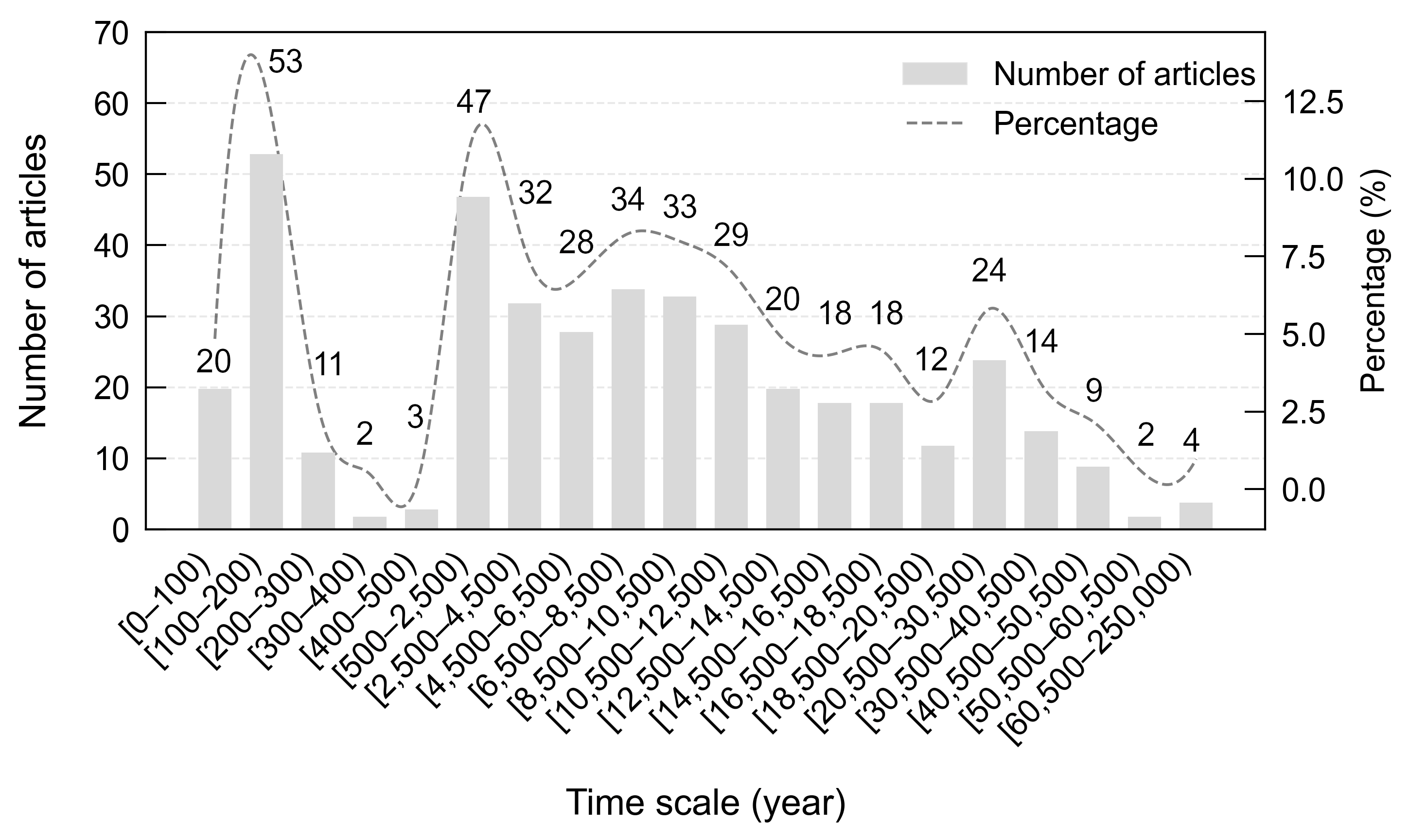
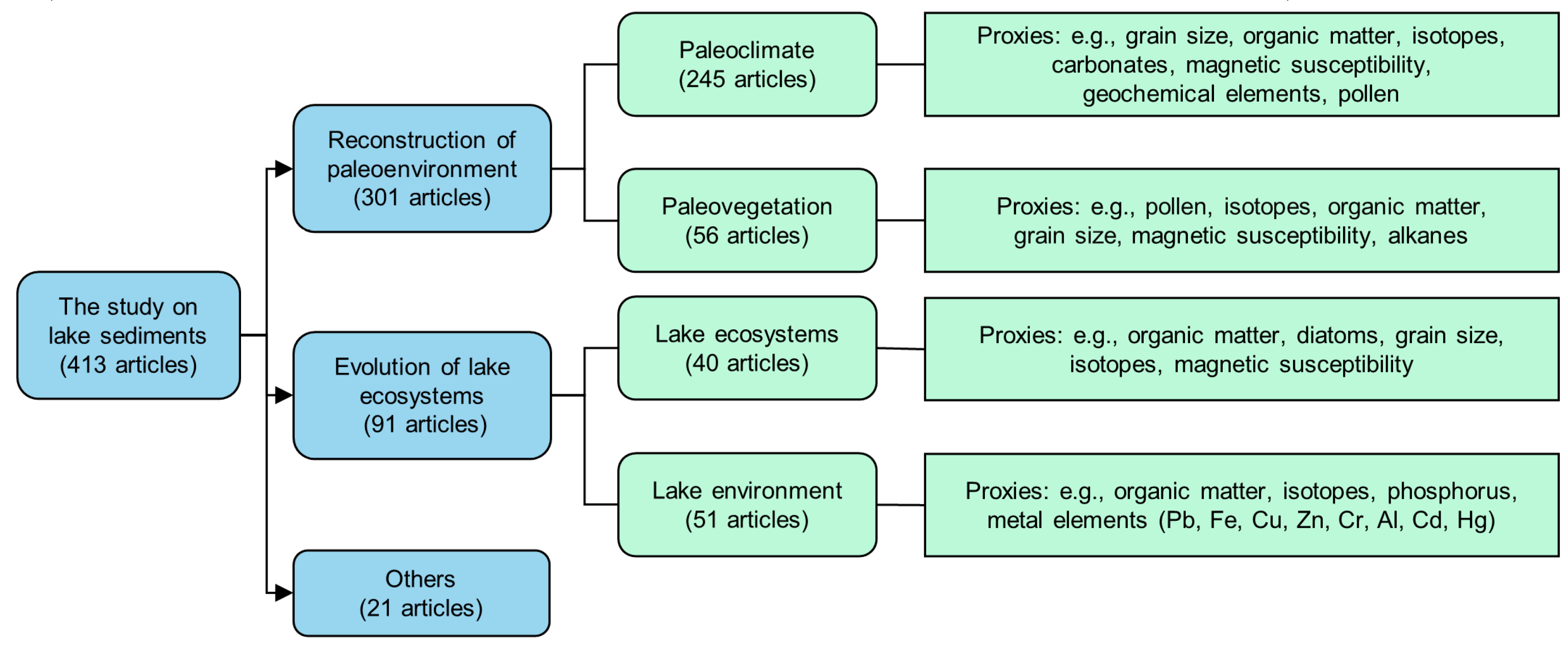
| Journal name | Number of articles | Impact factor (2022) |
|---|---|---|
| Palaeogeography, Palaeoclimatology, Palaeoecology | 41 | 3.0 |
| Quaternary Science Reviews | 33 | 4.0 |
| Quaternary International | 29 | 2.2 |
| Journal of Paleolimnology | 28 | 2.1 |
| The Holocene | 22 | 2.4 |
| Quaternary Research | 17 | 2.3 |
| Chinese Science Bulletin (科学通报) | 8 | NA |
| Quaternary Sciences (第四纪研究) | 7 | NA |
| Boreas | 6 | 2.2 |
| Global and Planetary Change | 6 | 3.9 |
| Hydrobiologia | 6 | 2.6 |
| Journal of Asian Earth Sciences | 6 | 3.0 |
| Earth and Planetary Science Letters | 6 | 5.3 |
| Review of Palaeobotany and Palynology | 5 | 1.9 |
| Journal of Lake Sciences (湖泊科学) | 5 | NA |
| Author | No. of articles | Institution |
|---|---|---|
| Ji Shen | 20 | Nanjing Institute of Geography and Limnology, CAS |
| Enlou Zhang | 17 | Nanjing Institute of Geography and Limnology, CAS |
| Liping Zhu | 17 | Institute of Tibetan Plateau Research, CAS |
| Junbo Wang | 14 | Institute of Geographic Sciences and Natural Resources Research, CAS |
| Xingqi Liu | 13 | College of Resources Environment and Tourism, Capital Normal University |
| Ulrike Herzschuh | 12 | Alfred Wegener Institute, Helmholtz Centre for Polar and Marine Research |
| Xiangdong Yang | 12 | Nanjing Institute of Geography and Limnology, CAS |
| Fahu Chen | 11 | College of Earth and Environmental Sciences, Lanzhou University |
| Aifeng Zhou | 10 | College of Earth and Environmental Sciences, Lanzhou University |
| Guoqiang Chu | 9 | Institute of Geology and Geophysics, CAS |
| Steffen Mischke | 9 | Faculty of Earth Sciences, University of Iceland |
Disclaimer/Publisher’s Note: The statements, opinions and data contained in all publications are solely those of the individual author(s) and contributor(s) and not of MDPI and/or the editor(s). MDPI and/or the editor(s) disclaim responsibility for any injury to people or property resulting from any ideas, methods, instructions or products referred to in the content. |
© 2024 by the authors. Licensee MDPI, Basel, Switzerland. This article is an open access article distributed under the terms and conditions of the Creative Commons Attribution (CC BY) license (http://creativecommons.org/licenses/by/4.0/).





